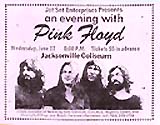

Initial idea for DSoTM had been discussed toward the end of
1971 at a band meeting that took place in Nick's kitchen.
Thus the album was born...Roger began writing lyrics around
the beginning of '72 while Dave and Rick concentrated on the
music.
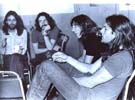
Jan. 1972 is the first time DSoTM is performed, at Brighton, as 'Eclipse'.
Due to a technical problem the band never completed 'Money'.
The standard show at the time (Eclipse, pre-DSoTM days) consisted of two sets: the first featured earlier numbers such as 'Set The Controls For The Heart Of The Sun', 'Careful With That Axe Eugene', and 'Echoes'; the second consisted of what was to later be known as "The Dark Side of the Moon" (then without the 'Eclipse' finale which was yet to be written). 'One Of These Days' was reserved as a breathtaking encore.
The "Dark Side of the Moon" was recorded between June of 1972 and January of 1973, and was released in March of 1973. It spent 724 weeks on the Billboard top 200. It was on the Billboard charts for 591 consecutive weeks between 1976 and 1988. Yet, despite its longevity on the charts, it topped the Billboard charts at Number 1 for only one week.
March 1973 during 'Careful With That Axe Eugene', pyrotechnics damaged the PA system, showering the audience with debris. The 2nd set went off without incident.
The WW11 Spitfire prop, used on all Dark Side shows, was designed and built by Derek Maddings, who was responsible for similar models employed in James Bond movies.
The "Dark Side of the Moon" is one of the biggest selling albums of all time, although it has only been awarded 'Gold' status (meaning that it has sold 500,000 copies). The 'Platinum' designation for million sellers did not come about until 1976, and the awards were not given retroactively.
'Dark Side' has it's own CD pressing plant in Germany.
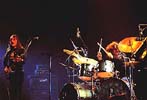
Pink Floyd unveiled their new work, DSoTM, provisionally titled
"Eclipse", by showcasing it in 4 shows in Feb. at the Rainbow
Theatre in North London.
To obtain the interspersed spoken messages throughout DSoTM, Roger interviewed a range of people, among those questioned and tape recorded were the road manager of a rival band, Roger the Hat, Abbey Road doorman Jerry Driscoll, late PF roadie Pete Watts, and Paul and Linda McCartney...although the McCartney's voices were never used.
'Money' was the only hit single from the album.
Alan Parsons won a Grammy Award for Best Engineered Album of 1973, for "Dark Side of the Moon".
The clocks at the beginning of 'Time' were originally recorded at an antique store by Alan Parsons.
Statistically, DSoTM should be playing somewhere on the planet every minute of every day.
The band Medicine Head had released an album titled "Dark Side of the
Moon" in late 1971...so the planned title was changed to "Eclipse".
When the Medicine Head album flopped, the original title was
revived by Pink Floyd.

Pink Floyd's first commercial endorsement was for a french soft drink in 1972.
Roger vowed never again to "sell out".
The original sleeve of "Dark Side", designed by Hipgnosis and drawn by George Hardie, was chosen to be used by the band, from among several other designs presented to them, and they did so in unison in about 3 seconds!
DSoTM was the *first* Pink Floyd album to have their lyrics printed on the sleeve (although recent reissues of earlier albums have had lyrics added retrospectively).
The sleeve includes 2 deliberate mistakes:
#1...no violet in the spectrum helped to amplify the design.
#2...rear sleeve showed the prism producing a converging spectrum,
a physical impossibility but necessary to allow open-out sleeves
to be arranged end-to-end forging a continuous design, useful
for in-store displays.

Vinyl copies came with 2 free stickers and 2 posters, one a collection
of live shots, the other a night view of the Pyramids of Giza. Both
are different in American copies, while the Japanese edition came with
a booklet.
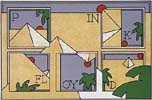 |
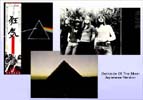 |
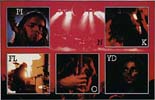 |
'Money' is the most performed piece in the band's history. Dave has performed the track for over 800 concerts.
Rick originally composed 'Us and Them' as a simple piano piece for Zabriskie Point, with the working title 'The Violent Sequence'. Given just one pre-DSoTM live airing at a '70 gig, it was then 21 minutes long!
'Any Colour You Like' title was taken from a misquoted adverstisement for the 1st mass produced car, the Model T Ford...which offered buyers the choice of "any color you like, so long as it's black".
The lyric about "the lunatic on the grass" is taken from an un-recorded song Waters wrote during the 'Meddle' sessions in '71. The title was....The Dark Side of the Moon!
'On the Run' was a guitar and keyboard improvisation.
The 'Great Gig in the Sky' was widely known to fans at the time, as 'The Mortality Sequence'.
'Brain Damage' was written at the time of 'Meddle', but not used on
the 'Meddle' album.
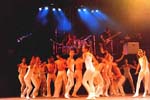
In November of 1972 Pink Floyd played for the Roland Petit Ballet in
Marseilles, France. The Pink Floyd Ballet was a ballet in four
movements.
In late 1973 Steve O'Rourke, the band's manager, signed a deal with CBS, who, like EMI in the UK, were prepared to give them the artistic freedom they wanted and had the financial muscle to successfully market and promote them on a much larger scale.
By the end of the year, sales of DSoTM was still on the charts in the US and the UK, and by then over 700,000 copies had been bought in the UK alone.
The "Dark Side of the Moon" has, to date, sold over 40,000,000 copies
worldwide, and sales continue to grow every year.
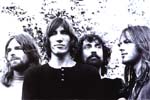
"I think every album was a step towards DSoTM in a sense. We were learning all the time, and our writing was getting better." Rick
"The album was intially about the pressures of real life-travel, money, madness-and then it broadened out a bit." Nick
"At the start we only had vague ideas about madness being a theme. We rehearsed a lot just putting down ideas and then in the next rehearsal we used them. It flowed really well. There was a strong thing in it that made it easier to do." Rick
"We thought we could do a whole thing about the pressures we personally feel that drive one over the top...the pressures of earning a lot of money; the time thing, time flying by very fast; organized power structures like the church or politics; violence, aggression." Roger
"It was not a deliberate attempt to make a commercial album. It just happened that way. We knew it had a lot more melody than previous Floyd albums and there was a concept that ran through it all. The music was easier to absorb." Rick
"It had to be quick, because we had a tour starting. It might have been only 6 weeks before we had to have something to perform. We went somewhere in W. Hampstead for a couple of weeks and we got a lot of pieces together." Roger
"Sometimes I look at our huge truck and tons and tons of equipment and I think 'Christ, all I'm doing is playing an organ'." Rick (comments made during the DSoTM tour)
"The drums used on the 'Time' track are roto-toms. I think we did some experiments with some other drums called "boo-bans", but the roto-toms actually gave the best effect." Nick
"I never sit down and try and think of ideas, ideas arrive, and I'll go...hmmmm, that's not a bad idea. Sometimes to write the last verse becomes an absolute nightmare." Roger
"We thought they were the best for us (CBS), largely because of their size. They're well organised. When we left Capitol they were badly organised. Also, we'll be the only act of our type on CBS. When you're competing against similar acts on the same label, someone is bound to be squeezed. We didn't want that." Rick
"That was the 1st Pink Floyd album that I had liked, that I thought was a total package. To me, that was the emergence of 4 years of Dave being with them, and having gotten their music a bit more rounded, a little less esoteric. And the lyrics were marvelous, real one-liners which really strike home." Clive Welham
"Dave made people enjoy it, and Roger made them think." Nick Griffiths
"In their own terms, Floyd strikingly succeed. They are dramatists supreme." Derek Jewell, The Sunday Times, reviewing PF's 4 day gig at Rainbow
"You have objectives, goals, desires and with DSoTM they were all achieved." Dave
"The amazing success of Dark Side put a lot of pressure on us." Rick
"It changed me in many ways because it brought a lot of money and one feels very secure." Rick
In 1988, when asked for insights about Dark Side's astounding longevity, Dave, Nick, Rick and Roger had this to say:
"It hit a chord, obviously. It still doesn't sound dated, it still sounds good when I listen to it. But I can't really say why it should achieve that longevity over some of the other great records which have been out. We always knew that it would sell more than we had sold of anything before, because it was better than anything we had done before-more complete and more focused. A better cover. Every detail was well attended to." Dave
"No idea at all, after we'd made it, actually sitting down listening to it for the first time in the studio, I thought 'This is going to be big. This is an excellent album'. Why it goes on and on selling, I don't know. It touched a nerve at the time. It seemed like everyone was waiting for this album, for someone to make it." Rick
"I don't think there is a clear reason for it. It's almost certainly a number of different things, which comprise the record itself and what's contained in it. Plus being the right record at the right time-and generating its own momentum, because it was in the charts for so long people start to think 'oh...that's the one that's been there awhile'." Nick
"It's very well balanced and well constructed, dynamically
and musically, and I think the humanity of its approach is
appealing." Roger